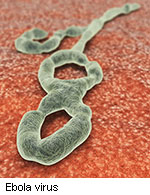Initial trials in Guinea show 100 percent effectiveness; larger trials are planned
MONDAY, Aug. 3, 2015 (HealthDay News) — An experimental Ebola vaccine appears highly effective, according to an interim analysis of findings from a clinical trial being conducted in the West African nation of Guinea. An independent body of international experts conducted the review and recommended that the trial of the VSV-EBOV vaccine continue. The findings were published online July 31 in The Lancet.
So far, the vaccine has been 100 percent effective in individuals, the United Nation’s World Health Organization (WHO) said in a news release on Friday. “The ‘ring’ vaccination method adopted for the vaccine trial is based on the smallpox eradication strategy,” John-Arne Røttingen, M.D., Ph.D., director of the division of infectious disease control at the Norwegian Institute of Public Health and chair of the study’s Steering Group, explained in the news release. “The premise is that by vaccinating all people who have come into contact with an infected person you create a protective ‘ring’ and stop the virus from spreading further. This strategy has helped us to follow the dispersed epidemic in Guinea, and will provide a way to continue this as a public health intervention in trial mode.”
The clinical trial first began in Ebola-affected communities on March 23, 2015, WHO said. So far, more than 4,000 adults who had close contact with about 100 Ebola patients — including relatives, neighbors, and coworkers — have voluntarily taken part in the trial. On the basis of evidence of the vaccine’s safety, the trial will now include teens aged 13 to 17 and possibly children aged 6 to 12.
“In parallel with the ring vaccination, we are also conducting a trial of the same vaccine on frontline workers,” Bertrand Draguez, M.D., the medical director for Doctors Without Borders, said in the news release. “These people have worked tirelessly and put their lives at risk every day to take care of sick people. If the vaccine is effective, then we are already protecting them from the virus. With such high efficacy, all affected countries should immediately start and multiply ring vaccinations to break chains of transmission and vaccinate all frontline workers to protect them.”
The VSV-EBOV vaccine was developed by the Public Health Agency of Canada and licensed to Merck and NewLink Genetics Corp.
Copyright © 2015 HealthDay. All rights reserved.








